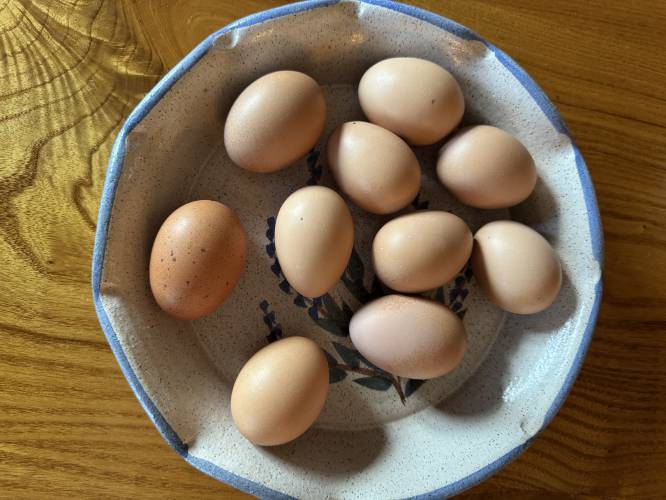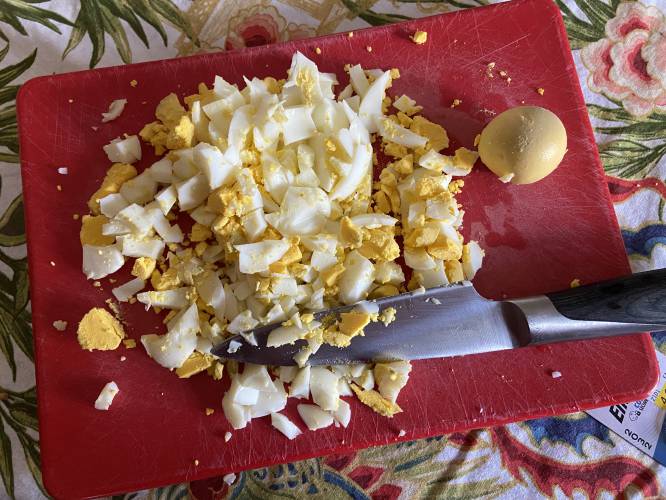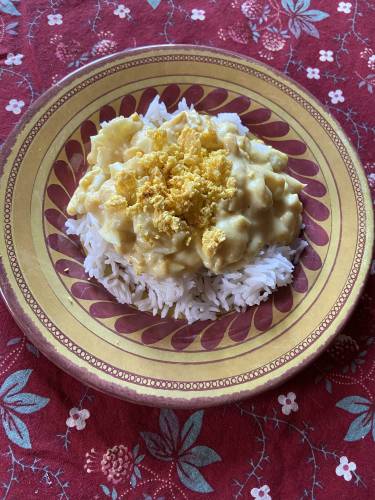Fascinated by the seemingly infinite uses of eggs: Creamed eggs are an easy and delicious post-Easter nursery food
| Published: 04-21-2025 12:40 PM |
The headlines last week were dire. Egg prices had reached an all-time high, just in time for Easter.
In large part because of avian flu, we have fewer chickens laying eggs at this point. This makes their eggs all the more precious.
I feel for restaurateurs, whose profit margins tend to be slim even when there isn’t a shortage of a food on which they rely. And of course I feel for the farmers whose chickens are dying from that awful disease, not to mention the chickens.
Nevertheless, I purchase eggs all the time. I love living near chicken farmers so my eggs are fresh. Moreover, even at inflated prices, I believe that eggs are an affordable source of protein for the non-professional cook.
They’re also easy. When I come home after a long day and don’t have the energy to do much cooking, an omelet is ideal for supper. It takes hardly any time to make and can absorb leftovers lying around in the refrigerator: vegetables, cheese, chicken, salsa, whatever.
I am frankly fascinated by the seemingly infinite uses of eggs. They have been consumed since at least 1500 B.C.E. and probably long before. How early cooks discovered their assets in cooking and baking is a mystery.
When Einstein came up with his theories of relativity, he was basing his work on centuries of scientific thought. It took even more genius, in my opinion, to figure out that eggs would make a cake (or a souffle!) rise. And yet the genius or geniuses who did so remain unknown and unacknowledged.
I recently consulted the “Food Timeline,” which offered little help on this topic.
Article continues after...
Yesterday's Most Read Articles
 Meeting physician retention goals: Two Greenfield Family Medicine Residency grads stay local
Meeting physician retention goals: Two Greenfield Family Medicine Residency grads stay local
 Mohawk Trail students to see new staff, new codes of conduct upon Aug. 27 return to school
Mohawk Trail students to see new staff, new codes of conduct upon Aug. 27 return to school
 Orange man, 35, dies in crash
Orange man, 35, dies in crash
 Explore the night sky: Stargazing programs coming to Heath, Colrain
Explore the night sky: Stargazing programs coming to Heath, Colrain
 Learning more about the Connecticut River’s natural filters: Research focusing on freshwater mussels
Learning more about the Connecticut River’s natural filters: Research focusing on freshwater mussels
 Grand opening of Buckland-Shelburne Elementary School playground set for Aug. 26
Grand opening of Buckland-Shelburne Elementary School playground set for Aug. 26
“Culinary evidence confirms breads and cakes using eggs were made by Ancient Egyptian and Roman peoples,” it says. “The reason most often sited was the recognition that eggs worked as binding (thickening) agents. How did that begin? The food historians [do] not venture into this territory.”
As a feminist, I cannot help wondering whether this lack of specificity might have stemmed from the fact that the bakers were female.
Back to the present: Eggs are one of the few things I have in the house all the time. I do not always have pasta. I do not always have milk. I cannot imagine not having eggs, however.
I like to have a couple of hard-boiled eggs on hand. They perk up a salad. They are divine when deviled. And they are everywhere right now because of Easter.
This week I am using them to make creamed eggs on toast … or rather, creamed eggs on rice, since bread is another comestible I don’t always seem to have in the house.
This dish is what the late food editor and writer Judith Jones used to call a “nursery food.” Nursery foods are simple, eminently digestible dishes that evoke the tastes and pleasures of childhood.
Jones discovered both Anne Frank (her diary, that is, and advocated for its publication in English) and Julia Child. She also once served as a judge at the Pudding Hollow Pudding Contest, an occasional extravaganza hosted here in Hawley. Clearly, she had excellent taste. She was right to endorse nursery foods like my creamed eggs.
Eggs should go down in price soon. As the days get longer, chickens tend to lay more of them. Meanwhile, I didn’t mind paying a premium for the ones that went into this dish.
If you would rather not add curry powder to your creamed eggs, feel free to use a little dill instead. Its gentle, herbal flavor sets off the eggs nicely.
I saved one of the egg yolks to chop up finely separately and sprinkle on top of each serving, but that’s not necessary, just fun.
Ingredients:
4 hard-boiled eggs
3 tablespoons butter
4 tablespoons (1/4 cup) flour
1 1/4 cups milk
2 teaspoons curry powder (or the flavoring of your choice)
salt and pepper to taste
Instructions:
Peel the eggs, and chop them into pieces. The pieces shouldn’t be too small; they give texture to the final dish.
In a saucepan, melt the butter. Whisk in the flour, and cook for a minute or two, whisking continuously. This gives the flour and butter a chance to bind on a molecular level into a roux.
Slowly whisk in the milk. Cook, still whisking, for another couple of minutes, until the sauce thickens. Whisk in the curry powder, the salt, and the pepper. Then stir in the pieces of egg. Leave the heat on briefly to warm the eggs.
Serve over toast. If, like me, you are out of bread, serve over rice or perhaps even noodles. Toast is best, however.
Serves 2 to 4, depending on appetite. This recipe may be doubled.
Tinky Weisblat is an award-winning cookbook author and singer known as the Diva of Deliciousness. Visit her website, TinkyCooks.com.









 ‘The freedom to be silly’: Hilltown Youth Recovery Theatre helps campers heal in mid-air
‘The freedom to be silly’: Hilltown Youth Recovery Theatre helps campers heal in mid-air How to grow a creative community: Meet the eight artists selected for CitySpace’s 2025 Pay It Forward program
How to grow a creative community: Meet the eight artists selected for CitySpace’s 2025 Pay It Forward program The melody lingers on: 85 years later, 102-year-old Montague resident to hear Glenn Miller band again
The melody lingers on: 85 years later, 102-year-old Montague resident to hear Glenn Miller band again Let’s Talk Relationships: The joy of feeling like yourself: Transitioning is about authenticity
Let’s Talk Relationships: The joy of feeling like yourself: Transitioning is about authenticity
